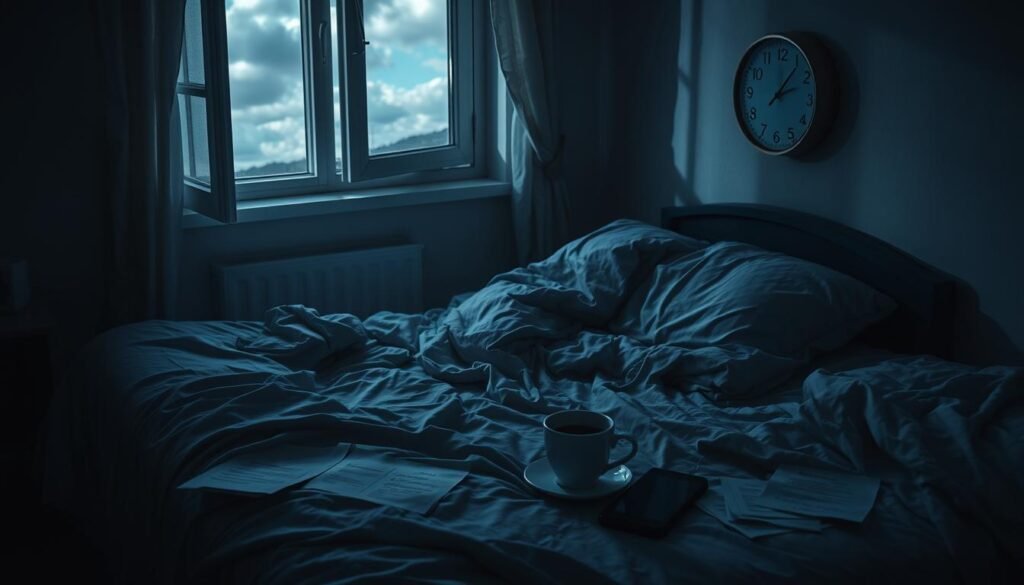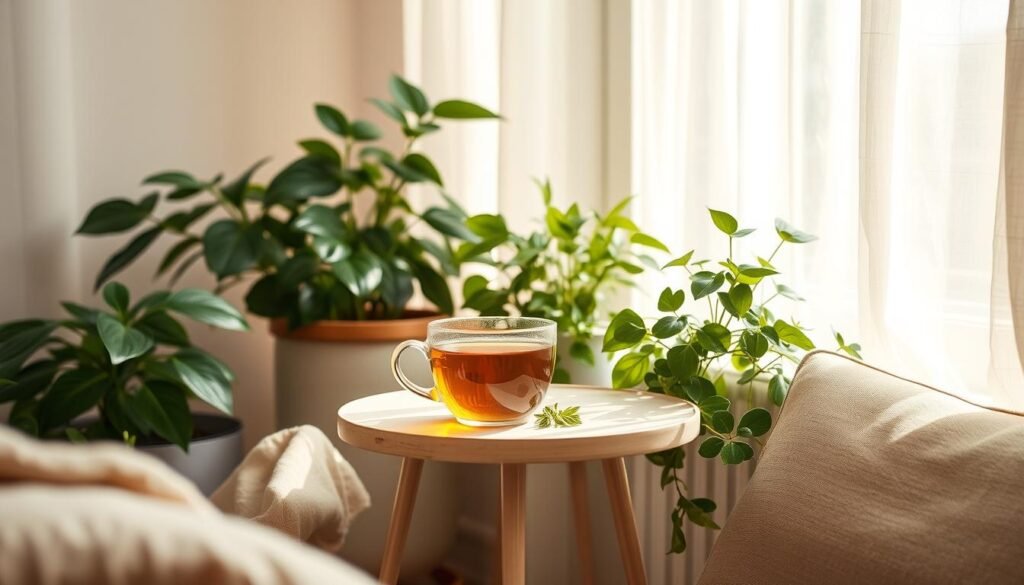Did you know around 30% of adults go through anxiety at some point? This anxiety doesn’t just disappear when we wake up. In fact, it tends to get worse in the morning. Many people find themselves dealing with stress first thing in the morning. This sets their day off on the wrong foot.
This article looks at why morning anxiety happens. We look at its causes, symptoms, and ways to cope. Understanding why you feel stressed in the morning can help. It allows you to find ways to feel more relaxed. And it makes the start of your day a lot smoother.
Key Takeaways
- About 30% of adults experience anxiety disorders at some time in their lives.
- Morning anxiety often worsens due to the body’s cortisol levels peaking in the early hours.
- Regular exercise can significantly reduce anxiety symptoms.
- Effective coping strategies include therapy, lifestyle changes, and mindfulness techniques.
- Adequate sleep and a balanced diet contribute to reducing morning stress.
Understanding Morning Anxiety
Morning anxiety is a heightened state of stress or worry that hits soon after waking up. It shines a light on the impact on our mental and physical health. Those facing it might notice symptoms like a racing heart, jitteriness, and feeling tense for no clear reason.
The causes of morning anxiety include several factors. A key one is the cortisol awakening response (CAR), which surges in the first hour after waking. This can make stress worse for people already under a lot of pressure. Other triggers are too much caffeine or sugar, low blood sugar, ongoing stress, and pre-existing anxiety disorders.
Feeling anxious in the morning can be normal, but it should not disrupt daily life. Strategies to feel better include exercising, being mindful, and challenging negative thoughts. Activities like walking or hitting the gym can boost mood and ease anxiety.
Self-care and professional advice can help manage morning anxiety. Eating breakfast can stabilize blood sugar, helping to lessen anxiety. This balanced approach is key to coping.
| Factors Contributing to Morning Anxiety | Recommended Strategies |
|---|---|
| Cortisol Awakening Response | Engage in morning exercise |
| Caffeine and sugar intake | Practice mindfulness and meditation |
| Chronic stress from previous nights | Challenge and reframe negative thoughts |
| Low blood sugar | Maintain a balanced diet including breakfast |
| Underlying anxiety disorders | Consider getting professional help |
What Is Morning Anxiety?
Morning anxiety is when you feel anxious and have racing thoughts as soon as you wake up. It’s not officially diagnosed but is very real for those who have it. It’s all about feeling uneasy right when the day begins, usually because you’re thinking about the day’s challenges or stress.
Some people worry a lot about things like work, money, or relationships. Stress from life’s events can cause these feelings. Knowing that it’s something you can manage helps people find ways to cope.
One reason people feel this way is because of cortisol, a stress hormone. It’s at its highest in the morning. This can make anxiety worse. Below is a table showing more about morning anxiety:
| Characteristic | Description |
|---|---|
| Nature | Onset of anxiety upon waking, often with racing thoughts. |
| Duration | Typically occurs in the morning but may extend throughout the day. |
| Causes | Anticipation of daily stressors, biological responses, disrupted sleep. |
| Impact | Affects mood, daily functioning, and overall well-being. |
Dealing with morning anxiety actively can change how we face daily hurdles. By figuring out what triggers it and practicing self-care, we can improve our mental well-being and everyday life.
Why Do I Wake Up With Anxiety
When we wake up feeling anxious, it can be confusing. But there are reasons for it. Things like stress, lifestyle habits, and even our body’s chemistry affect these feelings. The morning boost in cortisol, or the Cortisol Awakening Response (CAR), makes anxiety more intense. Recognizing why helps us see how common causes of morning anxiety link to anxiety disorders.
Common Causes of Morning Anxiety
Ever wonder why anxiety greets you in the morning? There’s not just one reason. Here are some major triggers:
- Cortisol levels: High cortisol in the morning can spike anxiety. This is even more true for those prone to anxiety disorders.
- Lifestyle choices: Too much caffeine or sugar can make anxiety worse.
- Chronic health conditions: Health issues like heart disease or diabetes can make morning anxiety stronger.
- Financial pressures: Money worries often lead to anxiety first thing in the morning.
- Sleep quality: A bad night’s sleep often results in waking up anxious.
Connection to Anxiety Disorders
There’s a clear link between morning anxiety and anxiety disorders. Let’s take Generalized Anxiety Disorder (GAD), for instance. It affects around 6.8 million adults in the U.S. These people worry a lot, all the time. But many don’t get help, leaving many struggling alone. Genes might be involved too, especially if a close family member has GAD. This is why knowing about the connection to anxiety disorders is crucial for dealing with it.
Symptoms of Morning Anxiety
Morning anxiety can show up with symptoms that make starting the day hard. It’s important to know these symptoms to handle the condition well. We will explore symptoms that fall into physical, cognitive, and emotional groups.
Physical Symptoms
Physical symptoms often start right after waking up. They can include:
- Racing heartbeat
- Muscle tension, particularly in the shoulders and neck
- Digestive issues, like stomach cramps or nausea
- Feeling tired or having low energy
- Being fidgety or restless
Cognitive Symptoms
Cognitive symptoms deal with mental challenges. They often include:
- Hard time focusing on tasks
- Thoughts rushing about what you have to do
- Constant worries or doubts
- Feeling swamped by everyday tasks
Emotional Symptoms
Emotional reactions are strong with morning anxiety. Usual emotional symptoms are:
- Dread when you wake up
- Feeling irritable or frustrated
- Feeling utterly overwhelmed
- Having panic attacks in severe cases

Knowing these symptoms is key for people living with morning anxiety. Being aware helps in finding ways to lessen anxiety’s effect on day-to-day life.
Possible Triggers for Morning Anxiety
Many people find certain things make their morning anxiety worse. These triggers can cause stress and worry as the day begins. Figuring out these causes can help manage feelings of anxiety. Stressful life situations, what we eat, and constant health problems are common causes.
Stressful Life Events
Changes in jobs, problems in relationships, or money worries can greatly affect us. They can make us feel very anxious, especially when we wake up. Knowing what triggers our anxiety can help us find ways to feel better.
Caffeine and Sugar Intake
Drinking too much caffeine can make our hearts beat faster and make us jittery. This can make our anxiety worse. Similarly, eating too much sugar can make us feel nervous. Cutting down on both may lead to a more peaceful morning.
Health Concerns
Long-term health problems can also make our anxiety worse, especially if they disturb our sleep. Worries about different parts of our lives, including our health, are common when we have Generalized Anxiety Disorder (GAD). Getting the right medical help can reduce our morning anxiety.
| Trigger | Description | Impact on Morning Anxiety |
|---|---|---|
| Stressful Life Events | Job transitions, relationship issues, financial concerns | Can cause overwhelming anxiety upon waking |
| Caffeine Intake | High consumption leading to increased heart rate, jitters | Heightens feelings of anxiety |
| Sugar Intake | Blood sugar spikes and crashes | Contributes to morning unease |
| Health Concerns | Chronic illnesses impacting sleep and well-being | Exacerbates anxiety symptoms |
How to Manage Morning Anxiety
To handle morning anxiety well, mix self-care, physical activity, and mindfulness. These methods better both your mental and physical health. They also bring calm and balance to your mornings.
Self-Care Strategies
Using self-care strategies regularly is key to fighting morning anxiety. Such strategies can be:
- Establishing a morning routine to provide structure.
- Prioritizing adequate sleep to reduce cortisol levels in the morning.
- Limiting caffeine and alcohol consumption, as these can exacerbate anxiety.
Physical Activity
Consistent physical activity can cut down anxiety symptoms a lot. Aim for 30–45 minutes of exercise, five days a week. It makes a big difference. Consider activities like:
- Walking
- Yoga
- Dancing
Such exercises boost your mood and help relax. This makes tackling morning anxiety easier.
Mindfulness and Meditation Techniques
Adding mindfulness techniques to your day can help calm your mind. Some examples include:
- Mindful breathing exercises to slow down racing thoughts.
- Guided meditation sessions to foster a tranquil mindset.
- Journaling to process emotions and thoughts.
These mindfulness practices proactive in dealing with anxiety. They lead to better mental health.
Deep Breathing Exercises to Calm Anxiety
Deep breathing exercises are a great way to ease anxiety, especially in tough mornings. They focus on filling the belly with air, not just the chest. This helps get more oxygen and lowers stress.
It slows down the heart rate. This gives a peaceful moment even when anxious thoughts are present.
Doing breathing exercises often can help deal with unease before it grows. Equal breathing is one method where you inhale and exhale for the same time. It’s from yoga and helps with relaxation and staying present. Other methods like Lion’s breath and alternate nostril breathing also help during stressful times.
Spending 20 to 30 minutes a day on belly breathing can cut down stress. The 4-7-8 method is also good. It works like a calm pill for your nerves, making mornings more tranquil.
Adding deep breathing exercises to your morning routine makes for a calm start. Doing these regularly betters mental health and builds emotional strength. It also helps manage anxiety better.
| Breathing Technique | Description | Benefits |
|---|---|---|
| Diaphragmatic Breathing | Breathe deeply into the belly, focusing on abdominal expansion. | Improves oxygen intake, reduces heart rate. |
| Equal Breathing | Inhale for a set duration and exhale for the same period. | Calms the mind and promotes relaxation. |
| 4-7-8 Breathing | Inhale for 4 seconds, hold for 7, and exhale for 8. | Acts as a natural tranquilizer. |
| Lion’s Breath | Forcefully exhale through the mouth while opening the eyes wide. | Releases tension and invigorates the body. |
| Alternate Nostril Breathing | Breathe through one nostril at a time, alternating sides. | Balances energy and reduces anxiety. |
Along with breathing exercises, try guided meditation to stop stress thoughts. With these breathing techniques, becoming calm and in control each day is possible.
Recognizing Negative Thought Patterns
Understanding negative thought patterns is key to managing morning anxiety. Recognizing anxiety thoughts and their impact on life is vital. Over 40 million adults in the U.S. suffer from anxiety disorders every year. Many of them struggle with anxiety’s cognitive patterns, adding to their stress.

Negative thinking often appears as automatic negative thoughts (ANTs), raising anxiety levels. Cognitive Behavioral Therapy (CBT) is effective in dealing with these. It has a success rate of 50% to 75%. With CBT techniques like thought records, individuals can spot and challenge negative thoughts.
Two main types of cognitive distortions are should statements and polarized thinking. The first raises anxiety with unrealistic expectations. “All or nothing” thinking, or polarized thinking, oversimplifies situations. This boosts stress and anxiety. These patterns can trap people in a cycle of escalating anxiety, making it harder to recover.
Other distortions include emotional reasoning and personalization. Emotional reasoning is when you think feelings are the truth. Personalization means taking things not related to you, personally. Recognizing these patterns can help people regain control of their thoughts. This leads to a healthier mental outlook.
Negative thought patterns stem from personal history, triggers, and mental health states. By identifying these patterns, people can challenge and change their thoughts. This opens the door to resilience and better well-being.
How Is Morning Anxiety Treated?
Treating morning anxiety involves many methods to help you feel better. It’s important to find the right mix of therapy, medicine, and lifestyle changes. These can help manage your anxiety more effectively.
Therapeutic Approaches
Cognitive Behavioral Therapy (CBT) is a key method for treating morning anxiety. It helps people spot and change negative thoughts that fuel their anxiety. CBT teaches how to think differently, easing anxiety symptoms.
Medication Options
In some cases, anxiety medicines are needed. Drugs like SSRIs and SNRIs can help. Working with a doctor to choose the right medicine and dose is key.
Lifestyle Changes for Anxiety Relief
Lifestyle shifts are also crucial for tackling morning anxiety. Eating well helps boost your mood and energy. Exercising for 30–45 minutes on most days can lower anxiety. Practices like meditation and spending time in nature also aid in stress management.
| Therapeutic Approach | Medication Options | Lifestyle Changes |
|---|---|---|
| Cognitive Behavioral Therapy | SSRIs | Balanced Diet |
| Mindfulness Practices | SNRIs | Regular Exercise |
| Support Groups | Tricyclic Antidepressants | Mindfulness and Meditation |
Building a Support System
A strong support system is essential for managing morning anxiety. Therapy and support groups help a lot. They offer emotional support and let people share experiences, reducing loneliness.
The Role of Therapy and Support Groups
Therapy is key in handling anxiety. It gives personalized coping methods. Talking in therapy can help you understand and fight anxiety better.
Joining support groups is also helpful. They build a community feeling. Here, sharing and listening to others makes you feel less alone. A 2022 study shows social support boosts resilience in tough times. It fosters mutual encouragement and healing.
With stress rising from economic and political worries, having a support system is vital. A survey found 77% worry about the future, and 73% are stressed about the economy. Therapy and groups provide crucial stress-management tools.

Additional Techniques to Alleviate Morning Anxiety
Morning anxiety is common, but certain techniques can help. Journaling for anxiety is one effective method. It lets people express feelings, sort thoughts, and think about their days. Writing down emotions helps release stress and brings clarity, lowering anxiety.
Journaling for Mental Clarity
Journaling is more than just an emotional release. It’s great for clearing your mind, especially in the evening. Writing about your day or things you’re grateful for improves self-awareness and emotional processing. It helps calm your mind and leads to better sleep, combating morning anxiety.
The Importance of Diet and Nutrition
Diet affects anxiety levels. Eating foods rich in vitamins, minerals, and omega-3s is key for brain health. Avoiding processed foods and eating whole foods improves mental well-being. Including magnesium in your diet can reduce morning anxiety. A healthy breakfast supports your entire day, showing the link between nutrition and anxiety.
Using these methods can improve well-being and reduce morning anxiety. Exploring routines and mindfulness is also beneficial. For more tips on handling stress and anxiety, check out this resource. It has a variety of strategies for effective stress management.
Conclusion
Waking up feeling anxious is common. It can be due to high cortisol levels or stress. Understanding morning anxiety helps find anxiety relief strategies. Knowing the reasons and symptoms is the first step. This knowledge helps manage anxiety for a better morning.
There are ways to handle morning anxiety. Self-care, eating well, and mindfulness help a lot. Adding omega-3s, fruits, and veggies to your diet can improve your mood. Seeking help through professional support like therapy is also key.
Being committed to these methods improves mental health. Awareness and the right tools can help you deal with morning anxiety. This leads to a better life quality. Managing morning anxiety boosts your day and your health overall.